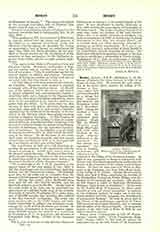

Hickey, ANTONY, O.F.M., theologian, b. in the Barony of Islands, Co. Clare, Ireland, in 1586; d. in Rome, June 26, 1641. He received his early education in his native place, entered the college of St. Antony at Louvain, which had just been founded as a refuge for Irish students, and received the Franciscan habit on November 1, 1607. Among his teachers at Louvain were the celebrated Irish scholars Hugh Mac an Bhaird (Ward) and Hugh Mac Caghwell, later Archbishop of Armagh. After his ordination to the priesthood, Father Antony was appointed lecturer in theology at Louvain, and subsequently professor in the college of St. Francis at Cologne. In 1619 he was summoned to Rome to collaborate with Father Luke Wadding in preparing for publication the Annals of the Franciscan Order and the works of Duns Scotus. He lived for some time at S. Pietro in Montorio on the Janiculum and, from 1624 till his death, in the college of St. Isidore. During the discussions which were held in Rome concerning the doctrine of the Immaculate Conception, Father Hickey won distinction by his learning and acuteness. His treatise on this subject is called by Marracius (Bibliotheca Mariana) “opus insigne et absolutum”. In his work on the Fourth Book of Sentences, he shows great breadth of view and critical perception; in addition to the scholastic method, he makes use of the historical method and fully recognizes the development of sacramental theology. He took an active part in the labors of the commissions appointed by Urban VIII to revise the Roman Breviary, and to examine into the affairs of the Eastern Church. At the general chapter of the order held in Rome in 1639, he was elected definitor general.
Hickey wrote “Commentarii in Lib. IV Sententiarum” (Lyons, 1639), “Nitela Franciscanae Religionis” (Lyons, 1627), in this book he refutes the aspersions cast on the early history of the Franciscan Order by Abraham Bzovius; “De Conceptione Immaculata B. Mariae Virgins”; “De Stigmatibus S. Catharine Senensis”, written by order of the Sacred Congregation of Rites; “Ad pleraque dubia moralia, et ascetica, gravissimae responsiones”. This work, which Wadding calls “opus doctissimum”, is still in MS. Among the MSS. preserved in the Franciscan Convent, Dublin, are several letters written to Father Hickey from Ireland on the civil and ecclesiastical affairs of that country. There is also an important letter of his on the Irish language. Many of the Irish bishops consulted him on matters of grave moment. His acquaintance with the history, language, and antiquities of Ireland was extensive, and in cooperation with John Colgan, Hugh Ward, and other Irish scholars, he drew up a plan for a critical history of Ireland in all its branches,—but this idea was not realized.
GREGORY CLEARY

